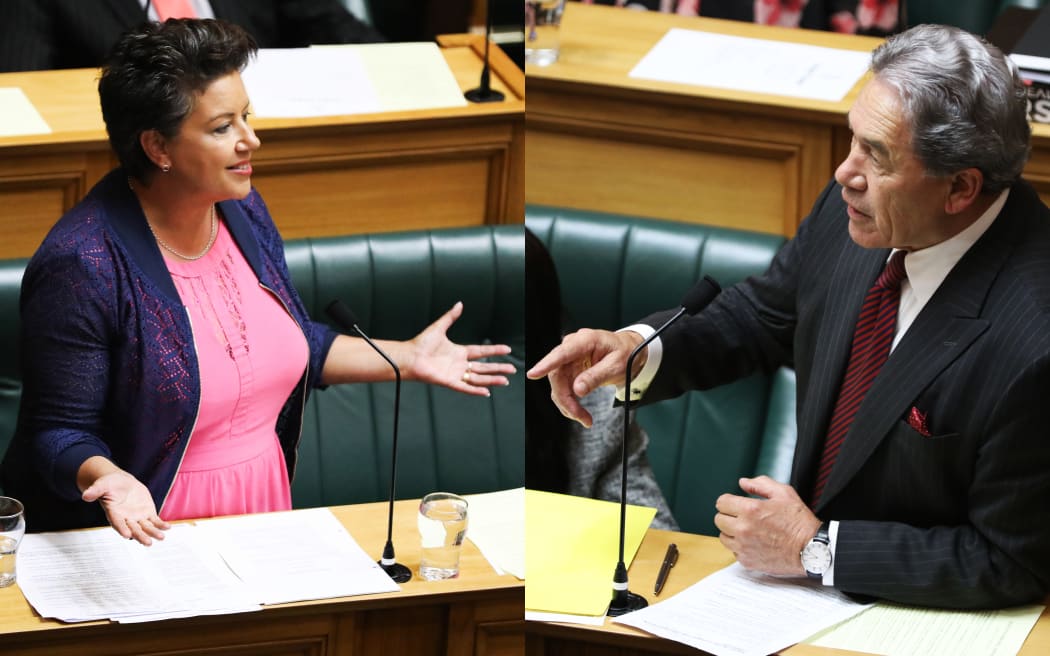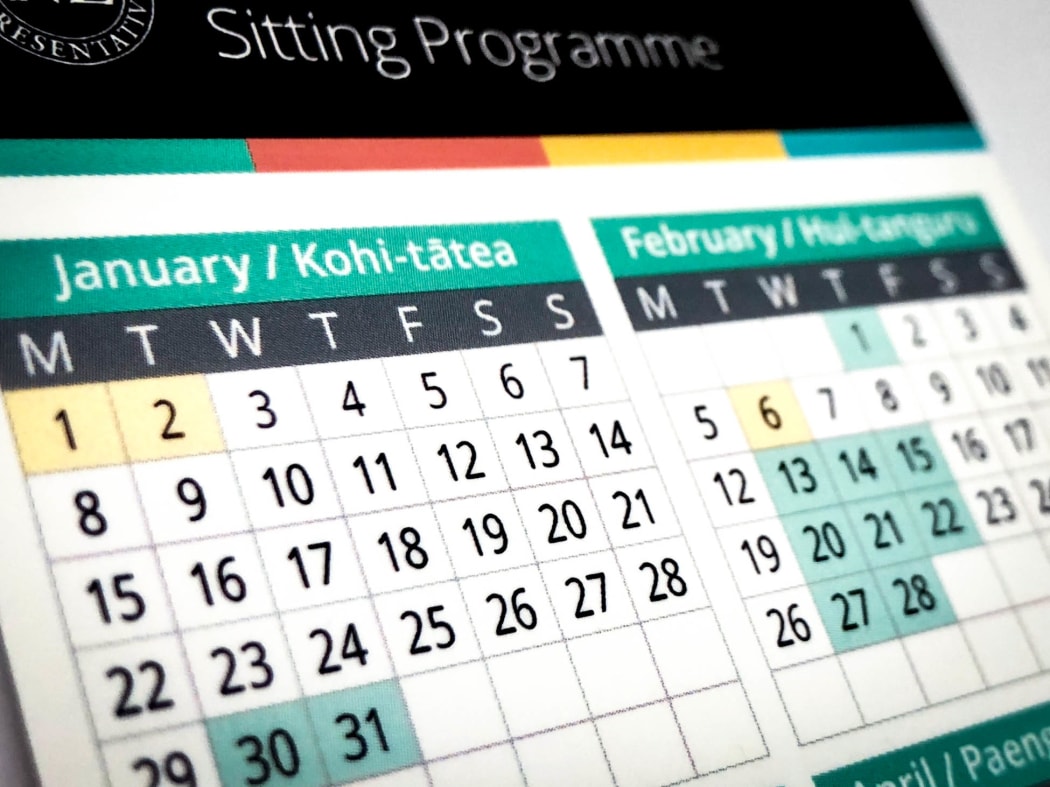MPs will debate when to sit and when to talk money before they work on bills today.
Two motions will be debated in the House after question time.
The first will set out the sitting calendar for 2019 (that’s the days MPs are required to be at Parliament) and the second motion will change the rules so the budget doesn’t have to be read on a Thursday.

National Deputy Leader Paula Bennett (left) and Deputy Prime Minister Winston Peters (right) in the House. Photo: VNP / Daniela Maoate-Cox / Phil Smith
*The Order Paper determines what MPs will work on but it’s subject to change so below is an outline of what they’ll try to work through.
Question Time - 2pm
Everybody’s favourite Parliament activity, question time.
It’s twelve oral questions to Ministers normally beginning with an exchange between the Prime Minister and the Opposition leader (although they're often not at Parliament on Thursdays so their seconds in command usually take this spot).
It’s an hour long test of wit, debating skills, and smarts with the Speaker acting as referee.
Opposition MPs often try to expose a failing of the Government while Government party MPs will often ask a soft (or patsy) questions so a Minister can brag about a policy announcement.
Supplementary/follow up questions are allocated to parties but the Speaker has overall say over whether they can be used.
Not debating a treaty on copyright
What:
-
The first reading Copyright (Marrakesh Treaty Implementation) Amendment Bill
-
It will change the Copyright Act 1994 to make sure New Zealand can comply with the Marrakesh Treaty which allows literature to be reprinted in a format for blind or visually impaired people, like Braille, large print, and audio books.
-
The treaty has a long name: the Marrakesh Treaty to Facilitate Access to Published Works for Persons Who Are Blind, Visually Impaired, or Otherwise Print Disabled.
-
The Marrakesh Treaty is a multilateral treaty that was negotiated by members of the World Intellectual Property Organization.
-
No debate on this one.
Who:
-
Minister for Broadcasting,Communications and Digital Media Kris Faafoi
Why:
-
New Zealand is party to more than 1900 treaties which are agreements between international entities or countries that are legally binding under international law. Legislative change is often needed to make sure New Zealand can meet those legal obligations and this is one of those changes.
-
All the treaties New Zealand is party to can be found here: New Zealand Treaties Online
-
This treaty is needed because persons with a print disability have an impairment that prevents them from enjoying a printed copyright work to the same degree as those who do not have that impairment.
-
No debate on this first reading. Rules for how treaties are debated in the House have been changed so MPs can debate the treaty as a whole at an earlier stage than was possible in the past. This debate replaces the first reading of any legislation needed to enact a treaty.
Planning when to sit for 2019

Photo: VNP / Daniela Maoate-Cox
What:
-
A Government notice of motion No 1 (sitting programme)
-
There will be a debate consisting of five speeches (one from each party) up to ten minutes in length on two parts: 1) the calendar for next year and; 2) adding a couple extra days to this year’s schedule.
Why:
-
MPs are required to be at Parliament on certain days mainly so they can process legislation. To make sure everyone knows when to turn up, the Government decides on a calendar of sitting days.
-
The calendar is split into blocks of sitting weeks, so it might be three weeks at Parliament and then a weeks away (so MPs can go back to their constituencies or select committees can meet without MPs being required in the House)
-
MPs might debate the timing of sitting blocks in terms of their political advantages/disadvantages
Announcing money plans
What:
-
Government notice of motion No 2 (financial cycle arrangements)
-
A debate on this motion of seven speeches, five minutes in length.
-
This is a request for a change to when the budget can be read next year.
Why:
-
Parliament’s rules say the budget has to be read on a Thursday. But because there is often legislation that needs to be enacted immediately (especially adjustments to taxes or excise) this means that the House goes into urgency and often sits on the Friday and even the Saturday.
-
The leader of the House, Chris Hipkins argues that if the budget is allowed to be read on a Tuesday that urgency won’t be necessary. So this week the Government will ask the Parliament for permission to ignore that rule.
Speeding up earthquake related claims
What:
-
The continued second reading of the Earthquake Commission Amendment Bill
-
There is an Earthquake Commission Act 1993 which this bill will amend to simplify and speed up the handling of claims for natural disaster damage, particularly when dealing with a large-scale natural disaster.
Who:
-
Minister responsible for the Earthquake Commission Megan Woods.
-
At its first reading the Ms Woods said:
“The four amendments are to remove EQC cover for personal property or home contents cover; to increase the EQC building cap cover from $100,000 to $150,000 plus GST; to lengthen EQC's pay notification time limit; and to clarify EQC's authority to share and publish information, including to facilitate settlement of EQC and private insurer claims.”
Keeping drinking water campylobacter free
What:
-
The Health (Drinking Water) Amendment Bill will have its first reading
-
The bill will change the speed with which a Minister may change drinking water standards and alters the appointment process for drinking-water assessors.
Why:
-
This bill is a response to the inquiry into the outbreak of campylobacteriosis in Havelock North and is the first stage in the government’s plans to reform drinking-water management.
-
The outbreak of campylobacteriosis in Havelock North resulted in over 5,000 people falling ill. The inquiry estimated that up to 100,000 New Zealanders become sick each year from drinking water.
Who:
-
This bill is in the name of the Minister of Health David Clark
Meth homes and damage to rentals
What:
-
Residential Tenancies Amendment Bill (No 2) will have its second reading.
-
This bill includes rules changes on methamphetamine contamination, tenant liability for property damage and what kinds of properties can come under the tenancy tribunal.
-
This bill has been to a select committee for consideration and the committee’s report recommends some amendments to the bill including requiring landlords to include insurance information in a tenancy agreement, and widening the focus from methamphetamine contamination to include other substances as well.
Who:
-
Originally introduced under the previous Government by then Minister of Building and Construction Nick Smith. The Bill is now in the name of Minister of Housing and Urban Development Phil Twyford.
Keeping doctors good
What:
-
The second reading of the Health Practitioners Competence Assurance Amendment Bill
-
Currently, health practitioners, their employers, and the Health and Disability Commissioner can report concerns over a health practitioner's ability, this bill will widen that to allow anyone, including patients and members of the public, to report poor practices to an authority.
-
It will also allow for independent performance reviews of authorities (i.e. health practitioners' supervisory and professional bodies), looking at how effectively and efficiently authorities perform their functions. The reviews would be conducted at least every 5 years.
-
This bill has been to a select committee which suggested some amendments, including that standards of cultural competence include respectful and and effective interaction with Maori.
Who:
- The Minister of Health David Clark is in charge
You can see how much the House gets done each sitting day by going here: Daily progress in the House

